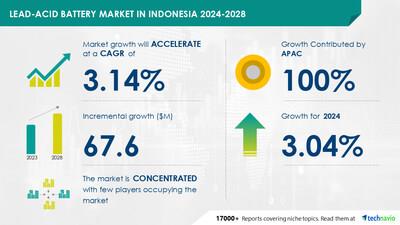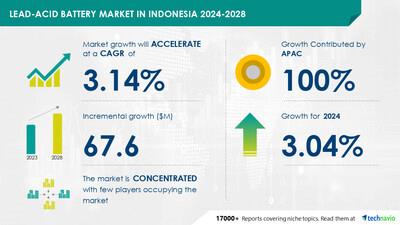
Lead-Acid Battery Market In Indonesia To Grow By USD 67.6 Million From 2024-2028, Driven By Automotive Market Growth, With AI Driving Market Transformation - Technavio
| Forecast period |
2024-2028 |
| Base Year |
2023 |
| Historic Data |
2018 - 2022 |
| Segment Covered |
Application (Automotive, Industrial, and Others), Type (Starter lead-acid battery and Deep-cycle lead-acid battery), and Geography (APAC) |
| Region Covered |
Indonesia |
| Key companies profiled |
Accumulatorenwerke HOPPECKE Carl Zoellner and Sohn GmbH, C and D Technologies Inc., EnerSys, Furukawa Electric Co. Ltd., GS Yuasa International Ltd., Guangdong Yuasa Battery Co. Ltd., PT Century Batteries Indonesia, PT New Indobatt Energy Nusantara, PT Selatan Jadi Jaya, PT. Tri Mega Baterindo, and PT. Trimitra Baterai Prakasa |
Key Market Trends Fueling Growth
Indonesia faces numerous challenges in its electrical grid infrastructure, including aging infrastructure, a shifting power generation landscape, and disparities in power demand and supply. These issues put strain on the existing grid infrastructure and limit its stability for seamless operations. The high cost of establishing grid infrastructure in rural and remote regions further hinders grid expansion. Microgrids , small-scale power generation systems that include storage components, offer a solution to these inconsistencies. They can operate in both grid-connected and island modes and are increasingly popular due to their use of renewable energy sources, such as solar and wind. Indonesia's unfavorable terrain and the need to electrify a significant portion of the population make microgrids an attractive option for local power generation and energy access. For instance, the microgrid project on Morotai Island utilizes solar PV for power generation and a 2,700-kWh lead-acid battery for energy storage. The Indonesian government aims to reach 100% electrification by the mid-2020s, and microgrids are expected to play a crucial role in achieving this goal. Additionally, microgrids enable large-scale industrial and commercial buildings to become self-sufficient in electricity supply. In provinces with the lowest electrification rates, such as Papua, microgrids offer a reliable and continuous power solution. The increasing adoption of microgrids is projected to lead to a corresponding increase in demand for lead-acid batteries in Indonesia, fueling the growth of the market during the forecast period.
The Lead-Acid battery market in Indonesia is witnessing significant growth due to increasing demand for energy storage devices in various sectors. Renewable energy and power backup systems are key drivers, as Indonesia focuses on reducing pollution rates and expanding renewable energy generation. Lead-Acid batteries, including SLI, Gel VRLA, and Calcium alloy grids, remain popular choices due to their affordability and reliability. The telecom sector, particularly wireless telecom industry and telecommunications sector, is a major consumer of Lead-Acid batteries for power backup. In the energy storage space, Lead-Acid batteries are used in data centers and construction projects. The mining, metals and pharmaceutical industries also rely on Lead-Acid batteries for various applications. Lithium-Ion technology and Nickel-Cadmium batteries are gaining traction, but Lead-Acid batteries continue to dominate the market due to their long charging cycles and recycling capabilities. The market is further boosted by the use of Lead-Acid batteries in commercial vehicles, motorcycles, passenger car manufacturing, oil and gas, and horizontal/vertical well applications. Indonesia's Lead-Acid battery market is expected to grow further as the country focuses on modernizing its electricity sector and expanding renewable energy generation.
Insights on how AI is driving innovation, efficiency, and market growth- Request Sample!
Market
Challenges
-
Lead-acid batteries remain the dominant choice in Indonesia's battery market due to their cost-effectiveness and mature technology. However, their use comes with environmental and health concerns as they contain toxic lead oxide. The growth of industries, particularly automotive, has driven up demand for lead-acid batteries. Yet, the improper disposal of lead components and the presence of polluting smelters have led to increased lead pollution and health risks. Lead-acid batteries have disadvantages, such as lower energy density, weight, and durability compared to substitutes like lithium-ion or nickel batteries . They also experience permanent capacity loss with each full discharge and have a shorter lifespan under continuous charge. Moreover, they cannot be stored in a discharged state due to sulfation, a phenomenon that forms lead sulfate crystals. These disadvantages may limit the demand for lead-acid batteries and negatively impact their market growth in Indonesia during the forecast period. The health and environmental risks associated with lead pollution necessitate the exploration of safer, more sustainable battery alternatives. The Indonesian government and industry must work together to address these challenges and promote the adoption of greener, more efficient battery technologies.
The Lead-Acid battery market in Indonesia is experiencing significant growth due to increasing demand for energy storage devices in various sectors. Renewable energy and power backup systems are key drivers, with the electricity sector and telecom industry leading the way. However, challenges persist, including high pollution rates from lead and sulfuric acid emissions, limited charging cycles, and recycling issues. Lithium-ion technology and Nickel-Cadmium batteries present competition, but Lead-Acid batteries remain popular for their affordability and reliability. Floating solar technology and data centers are also growing markets for Lead-Acid batteries. The construction, metals and mining, chemical and pharmaceutical, oil and gas, and commercial vehicle industries also utilize Lead-Acid batteries, particularly in applications like SLI batteries, Gel VRLA batteries, and Calcium alloy grids with carbon additives. Despite challenges, the Lead-Acid battery market in Indonesia continues to expand, driven by the need for energy storage solutions in diverse industries.
Insights into how AI is reshaping industries and driving growth-
Download a Sample Report
Segment Overview
This lead-acid battery market in Indonesia report extensively covers market segmentation by
Application-
1.1 Automotive
1.2 Industrial
1.3 Others
-
2.1 Starter lead-acid battery
2.2 Deep-cycle lead-acid battery
-
3.1 APAC
1.1
Automotive-
The lead-acid battery market in Indonesia's automotive segment is experiencing significant growth due to increasing consumer spending power and low fuel prices. In 2023, lead-acid batteries in passenger cars and two-wheelers were the major revenue contributors. Indonesia is also emerging as a significant EV producer, with the majority of these vehicles using lead-acid batteries for starting, lighting, and ignition (SLI) applications. Some EVs use deep-cycle lead-acid batteries for propulsion power. With the growing presence of EV manufacturers in the country, several lead-acid battery manufacturers are establishing local production facilities. Investments in EV and battery manufacturing plants will fuel the growth of the lead-acid battery market in Indonesia during the forecast period. Additionally, increasing investments in EV technology are expected to further boost market growth.
Download complimentary Sample Report to gain insights into AI's impact on market dynamics, emerging trends, and future opportunities- including forecast (2024-2028) and historic data (2018 - 2022)
Research Analysis
Lead-acid batteries, a type of rechargeable battery, have been the backbone of various industries in Indonesia for decades. These batteries, which include lead storage batteries, Gel VRLA (Valve Regulated Lead-Acid) batteries, and SLI (Starting, Lighting, Ignition) batteries, are primarily made up of lead and sulfuric acid. Calcium alloy grids and carbon additives are essential components that enhance their performance. The telecom sector, particularly the wireless telecom industry and telecommunications sector, heavily rely on lead-acid batteries for powering base transceiver stations and backup power systems. Data centers also utilize these batteries for uninterrupted power supply. In the energy storage space, lead-acid batteries play a significant role in renewable energy generation, supporting the electricity sector's transition towards sustainable energy sources. Despite the emergence of advanced technologies like Lithium-ion and Nickel-Cadmium batteries, the lead-acid battery market in Indonesia remains due to its affordability, reliability, and wide applicability. The market is expected to continue growing, driven by the increasing demand for energy storage solutions in various sectors.
Market Research Overview
The Lead-Acid battery market in Indonesia continues to grow due to the increasing demand for energy storage solutions in various sectors. Lead-Acid batteries, also known as Lead storage batteries, are widely used in Commercial vehicles, Motorcycles , Passenger car manufacturing, Oil and gas, Telecom, Mining, Data centers, Renewable energy, and Power backup systems. These batteries consist of lead plates immersed in sulfuric acid, which undergo a chemical reaction to produce electricity. Calciumalloy grids and Carbon additives are commonly used to enhance battery performance. In the Telecom sector, Lead-Acid batteries are essential for power backup in wireless telecom towers. In the Mining industry, they are used to power mining equipment. In the Energy storage space, Lead-Acid batteries are competing with Lithium-ion and Nickel-Cadmium batteries. Renewable energy applications, such as Floating Solar Technology, also utilize Lead-Acid batteries for energy storage. Despite their widespread use, Lead-Acid batteries have environmental concerns, including high pollution rates and limited charging cycles. However, the market is addressing these challenges through recycling programs and advancements in battery technology. The market is expected to grow further as the demand for energy storage solutions continues to rise in various sectors.
Table of Contents:
1 Executive Summary
2 Market Landscape
3 Market Sizing
4 Historic Market Size
5 Five Forces Analysis
6 Market Segmentation
-
Application
-
Automotive
Industrial
Others
-
Starter Lead-acid Battery
Deep-cycle Lead-acid Battery
-
APAC
7 Customer Landscape
8 Geographic Landscape
9 Drivers, Challenges, and Trends
10 Company Landscape
11 Company Analysis
12 Appendix
About Technavio
Technavio is a leading global technology research and advisory company. Their research and analysis focuses on emerging market trends and provides actionable insights to help businesses identify market opportunities and develop effective strategies to optimize their market positions.
With over 500 specialized analysts, Technavio's report library consists of more than 17,000 reports and counting, covering 800 technologies, spanning across 50 countries. Their client base consists of enterprises of all sizes, including more than 100 Fortune 500 companies. This growing client base relies on Technavio's comprehensive coverage, extensive research, and actionable market insights to identify opportunities in existing and potential markets and assess their competitive positions within changing market scenarios.
Contacts
Technavio Research
Jesse Maida
Media & Marketing Executive
US: +1 844 364 1100
UK: +44 203 893 3200
Email:
[email protected]
Website:
SOURCE Technavio
WANT YOUR COMPANY'S NEWS FEATURED ON PRNEWSWIRE? 440k+Newsrooms &
Influencers 9k+
Digital Media
Outlets 270k+
Journalists
Opted In GET STARTED

Legal Disclaimer:
MENAFN provides the
information “as is” without warranty of any kind. We do not accept
any responsibility or liability for the accuracy, content, images,
videos, licenses, completeness, legality, or reliability of the information
contained in this article. If you have any complaints or copyright
issues related to this article, kindly contact the provider above.


















Comments
No comment